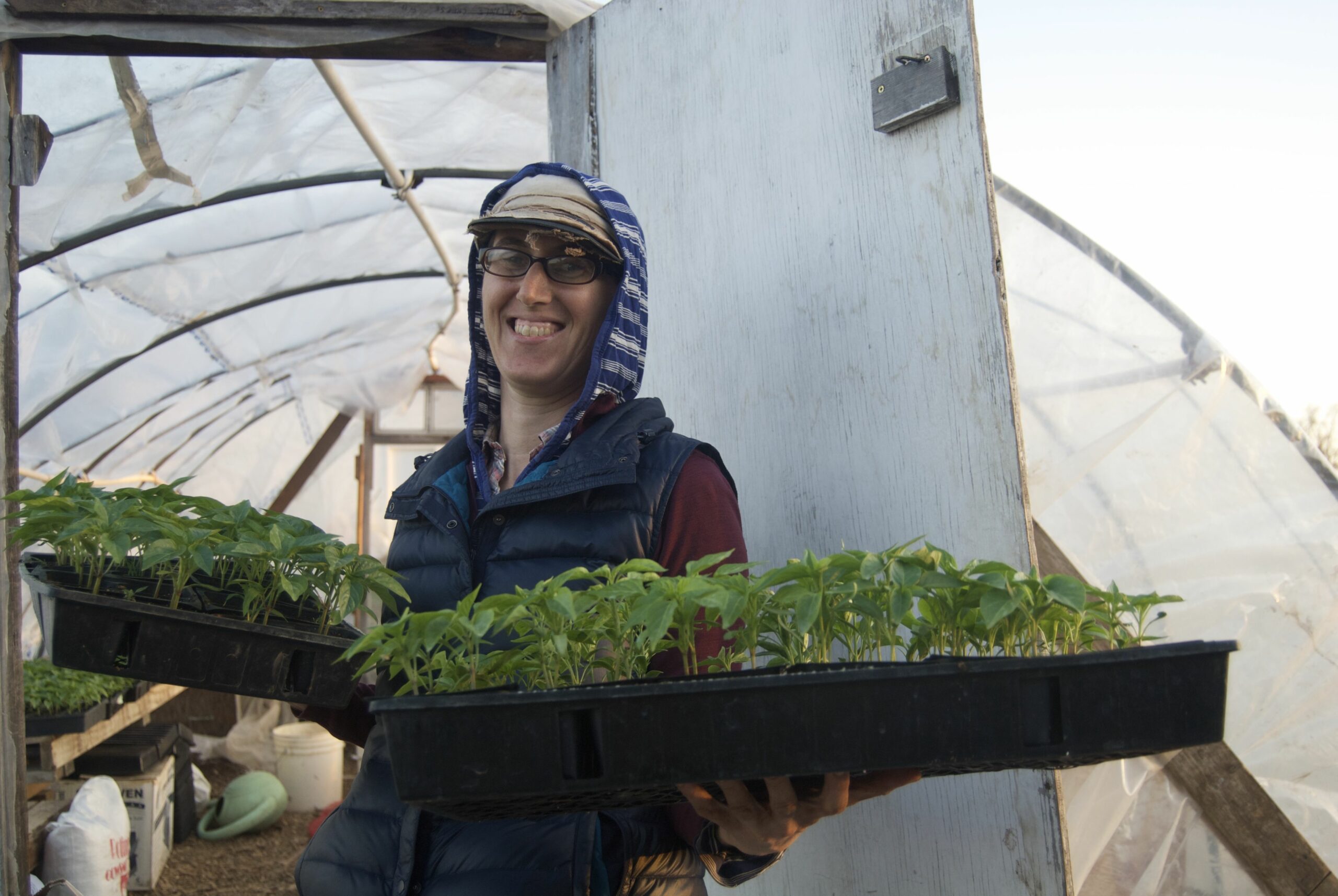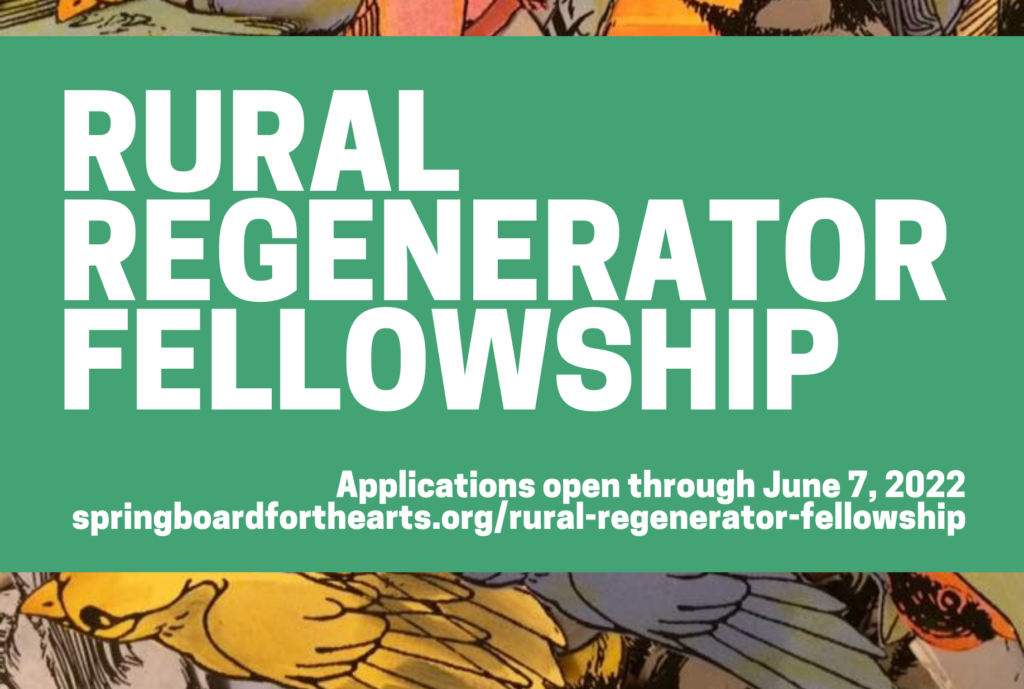Alice McGary: Sowing Seeds of Unity
The Rural Regenerator Fellowship brings together individual artists, makers, and culture bearers, grassroots organizers, community development workers, public sector workers and other rural change-makers who are committed to advancing the role of art, culture and creativity in rural development and community building. In 2022, we asked a collective of local writers to sit down with current Rural Regenerator cohort members to share more about their work.

Alice McGary is a lot of things, to a lot of people. First and foremost, she is a provider and a leader in her community addressing one of humanity’s most basic needs: food. McGary is one of the founders of the Mustard Seed Community Farm located just outside of Ames, Iowa. McGary and her team have been working this land for fifteen years and in that time have developed relationships with local homeless assistance providers, colleges and universities, neighboring farms, and families through a variety of initiatives.
All the work that happens on the farm is volunteer, including McGary’s labor which includes planting, growing, and distributing crops, coordinating community workdays and harvests, facilitating educational programs, mentoring interns, and working to reconstruct savannah and prairie land through sustainable farming practices. Although it is a lot of work to keep up with all the activities happening on the farm, McGary and her team are inspired by the principles set forth by the Catholic Worker Movement, whose core mission is “to live in accordance with the justice and charity of Jesus Christ.”
The Mustard Seed farm is an interfaith community that is part of the Catholic Worker Movement. At the heart of the Catholic Worker movement is a firm belief in the intrinsic dignity of every person. “What would the world look like if we just did what we thought was right and didn’t pay attention to wealth or money or success?” McGary Asks. “What would work be like if we were choosing to do work because it was helpful and good and meaningful?”
For McGary, part of that good work includes confronting the realities of over-cultivated lands in the Midwest and finding ways to engage fellow farmers in conversation about how to grow food in better alignment with the needs of the environment. “In [mono-farming] there’s so much devastation for the ecosystem, for the soil, for the planet, for the people,” she muses. “I’m not trying to make a big argument against my neighbors. I really care about our neighbors and they really care about their land. But I do feel like [Mustard Seed] is trying to farm in a way that is regenerative, in a way that is much more welcoming of all the creatures and the ecosystem, and also all the people.”
In addition to the farm’s commitment to growing organic crops, the team plants cover crops to slow soil erosion and increase soil nutrients, raises bees to help address declining pollinator populations and trains interns to look for patterns in crop health to determine the nutritional needs of the soil. These practices and others help McGary and her team maintain a nuanced relationship with a rapidly changing environment. It also helps them to appreciate the enormous effort of addressing climate change and their role as part of that struggle.
Meaning comes from the many community interactions had on the farm, most especially harvest days, where people come “from every direction.” It’s a chance for locals to better understand where their food comes from, and to experience collective care. McGary says, “I feel like this is one of the funnest times to be on the farm. People doing work together, enjoying each other’s company and having conversations out in the fields, sharing recipes, sharing their highs and lows. We all come together and harvest all the food that is ready that day. It really is a time in my week that gives me joy.”
Apart from the farm, McGary makes a variety of objects with her hands, like pottery, textiles and candles from recycled wax. She is also an accomplished fiddle player who has played dances, shows, and competitions across the Midwest. She says she most appreciates being able to use natural materials in her work that leave little ecological footprint. For example, she talks about using flowers and other plants grown on the farm to dye yarn made from their sheep’s wool. McGary loves making “beautiful, everyday things.” With natural dyed textiles for example,(most of these rugs are woven from recycled fabric, sometimes re-dyed, but I haven’t used much of my natural dyes for this, so maybe we should say something else, like, From discarded clothing and linens, she weaves) she weaves area rugs inspired by the sky at different times of day. Some are a combination of soft pink, orange and purple. Others are vivid collections of blue. McGary’s quilts are equally inspired. One quilt she created consists of over 1000 colorful squares that represent three years of her life. Each square symbolizes one day. Some of the squares have buttons, some have texture, some are solid colors, and together they create a stunning array of hue and pixel-like patterns.
When asked about the impact of the Fellowship on her work, McGary says that for the first time in a long time, she has the means to attend to her health and get routine medical care. She says, “I’ve been a full-time volunteer for 15 years and I made a choice to have very little income in my life in order to do work that I love.” Making her health a priority means she can focus more on her own development. She’s taking the first year of the Fellowship to learn new skills, investigate new ways of running the farm, and to consider purchasing art supplies, like a new loom.
Although McGary has a general idea of what she’d like to do, she’s taking her time to be “open-minded” and see what surprises come her way. One of the parts of the Fellowship she is most excited about is the opportunity to be mentored. As a “leader and mentor to so many,” McGary doesn’t often have a chance to be seen by others as someone who is in a process of becoming.
As we bring our conversation to a close, I ask McGary about what the theme of rural regeneration means to her. She pauses. She begins to speak, but wants to say “the right thing.” I tell her it’s a big question, and that we can return to it another time. Later that day, McGary sends an email, answering the question. She writes:
“I just went back out to check on the greenhouse, on the little plants, in this wild wind and bright sun, thinking about rural regeneration, and I just was thinking, ‘”to remember that we love this place.’” This place, big and small, right here, this land and these people and creatures and water and soil, and our wider community, extending slowly wider to the whole world. It was a centering thought for me in my mixed-up-ness, a hope for myself, and my community, and rural people everywhere, and all of us on this planet – to remember that we love is to remember why, but also how.”
A wise message, from a wise woman.


